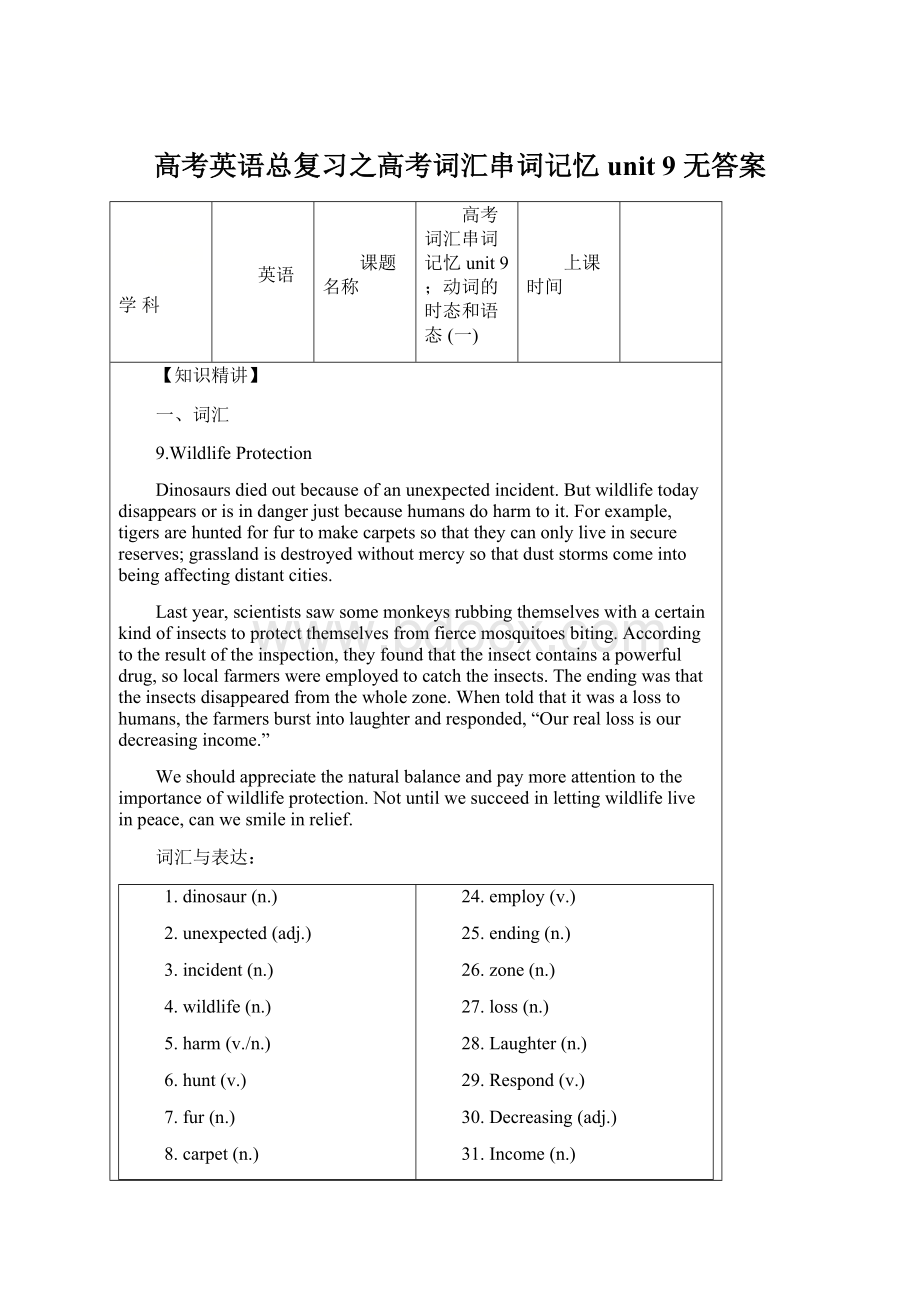高考英语总复习之高考词汇串词记忆unit 9 无答案.docx
《高考英语总复习之高考词汇串词记忆unit 9 无答案.docx》由会员分享,可在线阅读,更多相关《高考英语总复习之高考词汇串词记忆unit 9 无答案.docx(9页珍藏版)》请在冰豆网上搜索。

高考英语总复习之高考词汇串词记忆unit9无答案
学科
英语
课题名称
高考词汇串词记忆unit9;动词的时态和语态
(一)
上课时间
【知识精讲】
一、词汇
9.WildlifeProtection
Dinosaursdiedoutbecauseofanunexpectedincident.Butwildlifetodaydisappearsorisindangerjustbecausehumansdoharmtoit.Forexample,tigersarehuntedforfurtomakecarpetssothattheycanonlyliveinsecurereserves;grasslandisdestroyedwithoutmercysothatduststormscomeintobeingaffectingdistantcities.
Lastyear,scientistssawsomemonkeysrubbingthemselveswithacertainkindofinsectstoprotectthemselvesfromfiercemosquitoesbiting.Accordingtotheresultoftheinspection,theyfoundthattheinsectcontainsapowerfuldrug,solocalfarmerswereemployedtocatchtheinsects.Theendingwasthattheinsectsdisappearedfromthewholezone.Whentoldthatitwasalosstohumans,thefarmersburstintolaughterandresponded,“Ourreallossisourdecreasingincome.”
Weshouldappreciatethenaturalbalanceandpaymoreattentiontotheimportanceofwildlifeprotection.Notuntilwesucceedinlettingwildlifeliveinpeace,canwesmileinrelief.
词汇与表达:
1.dinosaur(n.)
2.unexpected(adj.)
3.incident(n.)
4.wildlife(n.)
5.harm(v./n.)
6.hunt(v.)
7.fur(n.)
8.carpet(n.)
9.secure(adj./v.)
10.reserve(n.)
11.mercy(n.)
12.dust(n.)
13.affect(v.)
14.distant(adj.)
15.rub(v.)
16.certain(adj.)
17.insect(n.)
18.fierce(adj.)
19.mosquito(n.)
20.bit(v.)
21.inspection(n.)
22.contain(v.)
23.powerful(adj.)
24.employ(v.)
25.ending(n.)
26.zone(n.)
27.loss(n.)
28.Laughter(n.)
29.Respond(v.)
30.Decreasing(adj.)
31.Income(n.)
32.Appreciate(v.)
33.Importance(n.)
34.Protection(n.)
1.Dieout
2.Indanger
3.Sothat
4.Comeinto
5.Protectfrom
6.Accordingto
7.Burstinto
8.Payattentionto
9.Succeedin
10.Inpeace
11.Inrelief
2、语法知识:
动词的时态和语态
(一)
※知识清单
动词的时态和语态
动词的时态
1、一般现在时主要用来表示人、事物的现在状况和特点;表示经常或习惯性的动作,句子中常有often,
always,fromtimetotime等时间状语;表示客观规律和永恒真理等。
Heusuallygoestoworkat7o’clockeverymorning.
Theearthgoesaroundthesun.
GuangzhouissituatedinthesouthofChina.
例1Ilearnedthatherfather____in1950.
AhaddiedBdiedCdeadDisdead
解析:
从句中的谓语动词动作虽然发生在主句谓语动词的动作之前,但因从句中有明确的过去时间状语
in1950,所以不用过去完成时态,而用一般过去时态。
考点一:
表示永恒的真理,即使出现在过去的语境中,仍用一般现在时。
如:
Ilearnedthattheearth
goesaroundthesunwhenIwasinprimaryschool.
考点二:
在时间和条件状语从句中,代替一般将来时;常用的引导词有:
时间:
when,until,after,
before,assoonas,once,themoment/theminute,theday;条件:
if,unless,provided.
Ifheacceptsthejob,hewillgetmoremoneysoon.
考点三:
在makesure(certain),seetoit,mind,care,matter+宾语从句,从句用一般现在时代替一般
将来时。
Solongasheworkshard,Idon’tmindwhenhefinishestheexperiment.
只要他努力工作,我不介意他什么时候做完试验。
考点四:
在themore…themore…(越……越……)句型中,若主句是一般将来时,从句通常用一般现在
时。
Theharderyoustudy,thebetterresultsyouwillget.
2、现在进行时表说话时或目前一段时间内正在进行的活动:
或表感情色彩,加强语气。
与频率副词,
如always,constantly,continually,again等连用表示说话人的某种感情色彩(赞叹、厌烦、埋怨等)。
WearehavingEnglishclass.
Thehouseisbeingbuiltthesedays.
Thelittleboyisalwaysmakingtrouble.
考点一:
在时间状语或条件状语从句中表示将来正在进行的动作。
Lookoutwhenyouarecrossingthe
street.
Don'twakehimupifheisstillsleepingat7tomorrowmorning.
考点二:
表示在最近按计划或安排要进行的动作(这时多有表示将来的时间状语)。
MarryisleavingonFriday.3、现在完成时表示动作发生在过去,完成在过去,但强调与现在情况仍有联系,其结果或影响仍存在。
现在完成时有一些标志性的时间状语:
考点一:
for+时间段;since+时间点
TheyhavelivedinBeijingforfiveyears.
TheyhavelivedinBeijingsince1995.
IhavelearnedEnglishfortenyears.
考点二:
常见的不确定的时间状语:
lately;recently,just,already,yet,uptonow;tillnow;sofar,these
days,
Hasitstoppedrainingyet?
考点三:
在表示“最近几世纪/年/月以来……”时间状语中,谓语动词用现在完成时。
inthepastfewyears/months/weeks/days;overthepastfewyears;duringthelastthreemonths;for
thelastfewcenturies,throughcenturies;throughouthistory等
考点四:
表示“第几次做某事,”或在“Itisthebest(worst,mostinteresting)+名词+that”后面跟现在完
成时。
ThisismyfirsttimethatIhavevisitedChina.
ThisisthemostinterestingfilmIhaveeverseen.
Thatistheonlybookthathehaswritten.
4.一般过去时表在过去某个特定时间发生且完成的动作,或过去习惯性动作,不强调对现在的影响,
只说明过去。
常跟明确的过去时间连用,如:
yesterday;lastweek;in1945,atthattime;once;duringthe
war;before;afewdaysago;when,注意:
考点一:
usedto+do,表示过去经常但现在已不再维持的习惯动作。
to为不定式,后接动词原形。
be/become/getusedto+doing,表示习惯于
Heusedtosmokealot.
Hehasgotusedtogettingupearly.
考点二:
在时间和条件状语从句中,代替过去将来时。
Hepromisedtobuymeacomputerifhegotaraise
5.过去进行时表示过去某个时间点或某段时间内正在发生的动作。
Theboywasdoinghishomeworkwhenhisfathercamebackfromwork.
Hewastakingawalkleisurelybythelakewhenheheardsomeoneshoutedforhelp.
Whatwereyoudoingatninelastnight?
Theradiowasbeingrepairedwhenyoucalledme.
6.过去完成时表示过去某个时间之前已经完成的动作,即过去完成时的动作发生在“过去的过去”,句
中有明显的参照动作或时间状语,这种时态从来不孤立使用(before,after,by,uptill)Therehadbeen25parksinourcityuptill2000.
Bytheendoflasttermwehadfinishedthebook.
Theyfinishedearlierthanwehadexpected.
考点一:
用于hardly/scarcely...when;nosooner...than句型中,主句用过去完成时,从句用一般过去时。
Ihadhardlyfinishedmyworkwhenhecametoseeme.
Ihadnosoonergotintotheroomthanitbegantosnow.
NosoonerhadIarrivedhomethanthetelephonerang.(注意主谓倒装)
考点二:
表示“第几次做某事”,主句用过去时,从句用过去完成时。
Thatwasthesecondtimethatshehadseenhergrandfather.
Itwas3yearssincewehadparted。
考点三:
动词hope,expect,think,intend,mean,want,suppose,plan用过去完成时,表示未实现的愿望、
打算和意图。
IhadhopedthatIcoulddothejob.
IhadintendedtoseeyoubutIwastoobusy.
7.一般将来时表在将来某个时间会发生的动作或情况。
常和tomorrow,nextyear,in2008等表示将来
的时间状语连用,其表现形式多达5种。
Beijingwillhostthe29thOlympicGamesin2008.
考点一:
一般将来时总是用在一些时间状语从句或条件状语从句的主句中:
Wewillbeginourclassas
soonastheteachercomes.
(主句用一般将来时,从句中一定要用一般现在时替代一般将来时。
)
考点二:
某些表示短暂性动作的动词如arrive,come,go,leave,start等,用现在进行时形式表示将来。
IamleavingforBeijingtomorrow.
考点三:
“祈使句+and/or+句子”,这种结构中and后面的句子谓语用一般将来时。
Useyourheadand
youwillfindaway.
考点四:
“am(is,are)goingto+动词原形”,表示打算要做的事或可能要发生的事。
“am(is,are)aboutto+动词原形”表示按照预定计划或打算准备着手进行的动作。
“am(is,are)to+动词原形”表示必须、必然或计划将要做的事。
TheyaretobemarriedinthisMay.
8、将来进行时表将来某个时间正在发生的动作,或按计划一定会发生的事情。
I’llbedoingmyhomeworkthistimetomorrow.明天这会我正在写作业。
ThePresidentwillbemeetingtheforeigndelegationattheairport.
9、将来完成时表在将来某时刻之前业已完成的事情,时间状语非常明显。
考点一:
常用的时间状语一般用by+将来的时间。
如:
bytheendofthisyear,by8o’clockthisevening,
byMarchnextyear以及由bythetime…,before或when等引导的副词从句。
Bytheendofnextmonth,hewillhavetraveled1000milesonfoot.
Bythetimeyoureachthestation,thetrainwillhaveleft.
BynextTuesday,Iwillhavegotreadyfortheexams.
考点二:
在时间和条件状语从句中,将来完成时则由现在完成时表示。
Thechildrenwilldotheirhomeworkthemomenttheyhavearrivedbackfromschool.
用所给词的适当形式填空
1.Ifyoudon’tlikethedrinkyou________(order),justleaveitandtryadifferentone.
2.I’llgotothelibraryassoonasIfinishwhatI________(do).
3.Themanagerwasworriedaboutthepressconferencehisassistant________(give)inhisplacebut,luckily,
everythingwasgoingonsmoothly.
4.ItisthemostinstructivelecturethatI________(attend)sinceIcametothisschool.
5.Inthelastfewyearsthousandsoffilms________(produce)allovertheworld.
6.Lastmonth,theJapanesegovernmentexpressedtheirthanksfortheaidthey________(receive)fromChina.
7.BythetimeJackreturnedhomefromEngland,hisson________(graduate)fromcollege.
8.Tom________(work)inthelibraryeverynightoverthelastthreemonths.
9.—Tommyisplanningtobuyacar.
—Iknow.Bynextmonthhe________(save)enoughforausedone.
10.—Iseveryonehere?
—Notyet.Look,there________(come)therestofourguests!
11.Barbaraiseasytorecognizeasshe’stheonlyoneofthewomenwho________(wear)eveningdress.
12.Everyfewyears,thecoalworkers________(have)theirlungsX-rayedtoensuretheirhealth.
13.Thebookhasbeentranslatedintothirtylanguagessinceit________(come)onthemarketin1973.
14.Whenyouarehome,giveacalltoletmeknowyou________(arrive)safely.
15.Uptonow,theprogram________(save)thousandsofchildrenwhowouldotherwisehavedied.
16.Formanyyears,people________(dream)ofelectriccars.However,makingthemhasbeenmoredifficultthanpredicted.
17.Inthenearfuture,moreadvancesintherobottechnology________(make)byscientists.
18.Experimentsofthiskind________(conduct)inboththeU.SandEuropewellbeforetheSecondWorldWar.
19.Aftergettinglostinastorm,amemberofthenavyteam________(rescue)fourdayslater.
20.Allvisitorstothisvillage________(treat)withkindness.
21.Thechurchtowerwhich________(restore)willbeopentotouristssoon.Theworkisalmostfinished.
22.Thiscoastalarea________(name)anationalwildlifereservelastyear.
23.Linda,makesurethetables________(set)beforetheguestsarrive.
24.You’vefailedtodowhatyou________(expect)toandI’mafraidtheteacherwillblameyou.
25.Peoplesaythatasmilecan________(pass)fromonepersontoanother,butactsofkindnessfromstrangersareevenmoreso.
26.Whenresearch________(assign),theprofessorexpectsthestudenttotakeitactivelyandtocompleteitwithminimumguidance.
27.Themeeting________(hold)tomorrow.
28.Allthetickets________(sell)outwhentheyrushedthere.
29.Thecloth________(wash)well.
30.Thedoor________(shut)easily.
Ⅱ.语法填空
Welcometoourschool.I’dliketointroduceyoutoplansforourschool.Alotofwork___1___(do)inthepastfewyears.Thelibrary___2___(complete)andisreadyforus